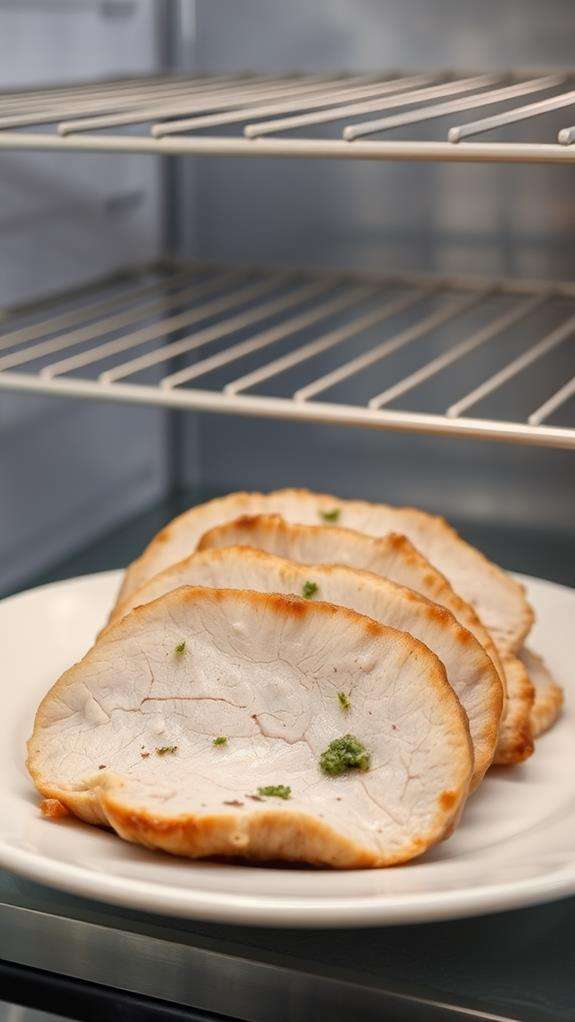How Long Does Sliced Turkey Breast Last in the Fridge
Sliced turkey breast lasts 3-5 days in your refrigerator when stored properly at or below 40°F. For unopened pre-packaged turkey, you'll get up to 2 weeks of freshness. You'll need to store your turkey in airtight containers or tightly wrapped packaging to maximize its shelf life. Watch for signs of spoilage like gray discoloration, slimy texture, or off-putting odors – these indicate it's time to discard the meat. Using vacuum-sealed storage can extend freshness to 7-10 days, while freezing preserves turkey for 1-2 months. Understanding proper storage techniques and safety guidelines will help you keep your turkey fresh even longer.
This post may contain affiliate links. If you make a purchase through these links, I may earn a commission at no additional cost to you. Additionally, portions of this post may be generated using artificial intelligence (AI) technology. While we strive for accuracy, please be aware that AI-generated content may not always be perfect and should be fact-checked when necessary.
The Spatula Scoops
- Opened sliced turkey breast stays fresh for 3-5 days when properly stored in the refrigerator at or below 40°F.
- Unopened pre-packaged turkey breast can last up to 2 weeks if consistently refrigerated at the correct temperature.
- Store sliced turkey in airtight containers or tightly wrapped packaging to maximize freshness and prevent early spoilage.
- Watch for signs of spoilage like gray coloring, slimy texture, off-putting odors, or mold growth.
- Vacuum-sealed turkey breast can extend shelf life to 7-10 days when kept at proper refrigeration temperatures.
Storage Time Guidelines

Your sliced turkey breast's shelf life depends heavily on proper storage and timing. When you're managing your food storage needs, it's vital to understand that properly stored sliced deli meat can maintain its quality for different durations based on whether it's pre-packaged or freshly cut.
For opened packages of sliced turkey breast, you'll want to consume the meat within three to five days to guarantee maximum safety and flavor. However, if you've purchased an unopened, pre-packaged variety, you can expect it to last up to two weeks in your refrigerator, provided you're maintaining a temperature of 40°F or below. To extend shelf life, you should always store your turkey in airtight containers or wrap it tightly to minimize air exposure.
You'll need to monitor your turkey for any signs of spoilage, including changes in color, unusual odors, or slimy texture. It's best to implement a labeling system for your containers, marking the purchase or opening date clearly. This practice helps you track freshness and guarantees you're consuming the turkey within safe timeframes.
Signs of Turkey Spoilage

While proper storage times guide your food safety practices, knowing how to spot spoiled turkey is equally important for protecting your health. When you're checking your sliced deli meat, there are several clear indicators that can tell you if the meat has spoiled.
Your first line of defense is visual inspection. If you notice any discoloration, particularly a dull gray or greenish tint on the turkey's surface, it's time to toss it out. Fresh turkey should maintain its natural pink-to-light brown color. Next, trust your nose – if you detect any sour or off-putting odors when opening the package, don't take chances with your health. The turkey should have a mild, neutral smell.
The texture of your sliced turkey can also reveal signs of spoilage. When you touch the meat, it should feel relatively dry and firm. If you notice a slimy or sticky film on the surface, that's a clear warning sign that bacteria have begun to multiply. Additionally, if you spot any fuzzy or discolored patches that could indicate mold growth, dispose of the turkey immediately, as it's no longer safe to eat.
Proper Storage Methods

To keep your sliced turkey breast fresh as long as possible, you'll need to store it in an airtight container or resealable plastic bag with all excess air squeezed out. Your refrigerator's temperature should be set at 40°F or lower, and you'll want to place the turkey in the coldest part of your fridge, usually near the back. For best results, always write the date on your storage container, which helps you track when you've opened the package and guarantees you'll use the turkey within the recommended 3-to-5-day window.
Airtight Container Requirements
Proper storage of sliced turkey breast demands an airtight container or resealable bag to maintain its freshness and prevent bacterial growth. When you're selecting a container, make sure it's clean, completely sealable, and appropriately sized for your portions to minimize excess air space.
You'll want to choose containers that have secure, tight-fitting lids or bags with reliable sealing mechanisms. Before placing your turkey in the container, remove as much air as possible, as excess air can accelerate spoilage. If you're using plastic bags, you can press the air out manually or use a vacuum sealer for best results.
Remember that even when properly stored in an airtight container, your sliced turkey will only last 3 to 5 days in the fridge. It's important to label your container with the date you stored the turkey, allowing you to track its freshness accurately. Place the container in the coldest part of your fridge, typically the back, where temperatures remain most consistent. If you notice any unusual odors or appearance changes before the 3-to-5-day window ends, it's best to discard the turkey regardless of the storage date.
Refrigeration Temperature Guidelines
Beyond airtight containers, maintaining the right temperature stands as the cornerstone of safe turkey storage. Your refrigeration temperature must stay at or below 40°F to prevent harmful bacteria from multiplying on your sliced turkey breast. When you've opened a package of turkey, you'll need to be particularly vigilant about temperature control to guarantee it'll last in the refrigerator for its full 3-5 day shelf life.
To maximize your turkey's freshness and safety, follow these essential temperature guidelines:
- Position your sliced turkey in the back of the refrigerator, where temperatures remain most consistent
- Check your fridge's temperature regularly using a reliable thermometer to maintain the 40°F threshold
- Store deli turkey away from the door compartments, where temperature fluctuations occur most frequently
- Return turkey to the refrigerator within 2 hours of serving to prevent temperature abuse
If you're storing unopened packages, you can expect them to last up to two weeks when properly refrigerated. Remember to always check the date you've written on the container and watch for any signs of spoilage, regardless of how well you've maintained the temperature.
Extending Turkey Shelf Life

Several effective methods can help you maximize the shelf life of your sliced turkey breast. As a popular sliced deli meat, proper storage is essential to maintain its freshness and safety. You'll want to focus on temperature control, packaging, and monitoring for signs of spoilage to extend shelf life.
| Storage Method | Duration | Best Practices |
|---|---|---|
| Refrigeration | 3-5 days | Store below 40°F |
| Vacuum Sealed | 7-10 days | Remove excess air |
| Freezer Storage | 1-2 months | Double wrap |
| Airtight Container | 4-6 days | Clean container first |
| Original Packaging | 2-3 days | Keep sealed |
The best way to store your turkey is by implementing multiple preservation techniques. Start by keeping it in an airtight container or vacuum-sealed bag, which considerably reduces bacterial growth. If you're not planning to consume the turkey within five days, consider freezing portions in separate packages. While storing, regularly check for any discoloration, unusual odors, or slimy texture – these are clear signs of spoilage that indicate it's time to discard the meat. Remember to always place your turkey in the coldest part of your refrigerator to maintain ideal freshness.
Food Safety Best Practices

To guarantee your sliced turkey breast stays safe to eat, you'll need to maintain proper refrigeration temperatures at or below 40°F and always use clean, airtight containers or well-sealed wrapping materials. You must wash your hands thoroughly with soap and warm water before and after handling turkey to prevent harmful bacteria from spreading to other foods or surfaces in your kitchen. When storing your turkey, be sure to place it on the bottom shelf of your refrigerator in a clean container that's separate from raw meats and other ready-to-eat foods to avoid any potential cross-contamination.
Safe Handling Temperatures Required
Maintaining proper temperature control is vital for sliced turkey breast safety. You'll need to keep your deli meats at or below 40°F (4°C) to prevent harmful bacteria from growing. The coldest part of your refrigerator, typically at the back, provides the ideal storage environment for your sliced turkey breast.
To guarantee your turkey stays fresh and safe to eat, follow these important temperature guidelines:
- Store sliced turkey breast immediately at 40°F (4°C) or lower when you get home from the store
- Monitor your refrigerator's temperature regularly using a reliable thermometer
- Keep turkey in the back of the fridge, away from the door where temperatures fluctuate
- Never leave sliced turkey out at room temperature for more than 2 hours
When handling your deli meats, remember that food safety starts with proper temperature control. If you're unsure whether your refrigerator maintains the right temperature, place a thermometer in different areas to identify the coldest spots. This simple step helps guarantee your sliced turkey breast stays fresh throughout its 3-to-5-day storage window while preventing potentially harmful bacterial growth.
Proper Storage Container Methods
Choosing the right storage container plays a critical role in extending your sliced turkey breast's shelf life. When you're handling Freshly Sliced Deli Meat, you'll want to transfer it to airtight containers or resealable plastic bags immediately after purchase, making certain to squeeze out as much air as possible before sealing.
For proper storage container methods, you'll need to take into account both the container type and how you organize your sliced meats. Always use clean containers with tight-fitting lids, and if you're using plastic bags, verify they're specifically designed for food storage. You'll want to label your containers with the date you've stored the turkey, which helps you track its 3-to-5-day shelf life. When you refrigerate your turkey, place it in a designated meat drawer or on a lower shelf where the temperature remains consistently below 40°F.
If you're planning to store multiple layers of turkey slices, place a piece of wax paper between layers to prevent them from sticking together. This method also makes it easier to separate portions when you need them, reducing handling time and potential contamination risks.
Cross-Contamination Prevention Tips
Since food safety directly impacts your health, preventing cross-contamination when handling sliced turkey breast requires consistent attention to hygiene practices. Whether you're bringing home turkey from the deli counter or handling pre-packaged slices, maintaining food safe conditions is essential to prevent bacterial spread.
To protect yourself and your family from foodborne illness, follow these vital cross-contamination prevention steps:
- Wash your hands thoroughly with soap and water for 20 seconds before and after handling turkey, and use separate cutting boards for raw meats and ready-to-eat foods.
- Keep your refrigerator temperature at or below 40°F, and store sliced turkey on the bottom shelf to prevent drips from contaminating other foods.
- Clean all surfaces, utensils, and containers that contact the turkey with hot, soapy water immediately after use.
- Never reuse packaging materials or containers that have held raw meat without thorough sanitization.
Remember to maintain separate storage zones in your refrigerator for different food types, and always use clean utensils when serving sliced turkey. If you're storing leftover turkey from the deli counter, transfer it to a clean, sealed container rather than keeping it in the original packaging to guarantee maximum food safety.
From Store to Table

The journey of sliced turkey breast from store to table requires careful attention to maintain its safety and quality. As a deli meat enthusiast or food editor might tell you, your first step is selecting the freshest package by checking the sell-by date at the store, ensuring you'll get the maximum time for your turkey to last in the fridge.
When you're ready to transport your sliced turkey breast home, it's essential to minimize the time it spends in the temperature danger zone. You'll want to head straight home and refrigerate it immediately. Once you've opened the package, store your deli meats in an airtight container or resealable bag, making sure to squeeze out excess air. Place it in the coldest part of your fridge, typically at the back, where the temperature remains most consistent.
Freezing for Later Use

Preserving sliced turkey breast in your freezer can greatly extend its shelf life up to two months when you maintain proper storage conditions. Whether you've got turkey sliced from the deli or packaged varieties, proper freezing techniques will help maintain its quality and prevent freezer burn.
To properly Freeze Deli turkey, you'll need to follow these essential steps:
- Package your sliced turkey in airtight freezer bags, removing as much air as possible before sealing to prevent ice crystals from forming
- Divide larger quantities into smaller portions that you'll realistically use in one sitting
- Double-wrap the turkey if using original packaging, adding an extra layer of plastic wrap or aluminum foil
- Label each package with the freezing date using a permanent marker
If you're planning to store multiple layers of turkey slices, consider placing wax paper between them for easier separation when thawing. While the original packaging might seem sufficient, using dedicated airtight freezer bags offers superior protection against freezer burn and helps maintain the turkey's texture and flavor throughout its frozen storage period.
Frequently Asked Questions
Can You Eat Sliced Turkey After 7 Days?
You shouldn't eat sliced turkey breast after 7 days, as it's past the safe consumption window of 3-5 days recommended by food safety experts. Even if you've stored it properly in an airtight container at 40°F or below, there's a significant risk of harmful bacterial growth after day 7. While the turkey might look fine, it's not worth risking foodborne illness. It's best to either consume or freeze your turkey within the recommended timeframe.
How Long Does Sliced Deli Turkey Last in the Fridge?
You'll want to consume opened sliced deli turkey within 3 to 5 days when it's stored properly in your fridge. If you've got an unopened package, it'll last about 2 weeks when kept at or below 40°F. Make sure you're storing your turkey in an airtight container or wrapping it tightly to keep it fresh. Don't forget to check for any signs of spoilage, like unusual smells, slimy texture, or discoloration before eating.
Can I Eat 5 Day Old Deli Turkey?
Yes, you can eat 5-day-old deli turkey if it's been properly stored in your fridge and shows no signs of spoilage. You'll want to check that it's been kept at 40°F or below and stored in an airtight container or tightly wrapped. Before eating, inspect the turkey for any discoloration, slimy texture, or off-putting odors. If you notice any of these warning signs, it's best to discard the meat, even if it's within the 5-day window.
Is Turkey Still Good After 5 Days in the Fridge?
Like a Netflix subscription that's about to expire, your turkey's time is running out at the 5-day mark. While you technically can eat turkey that's been in the fridge for 5 days, you're pushing your luck. You'll need to check for warning signs: if there's any odd smell, slimy texture, or discoloration, don't risk it. When in doubt, throw it out – your stomach will thank you later.





